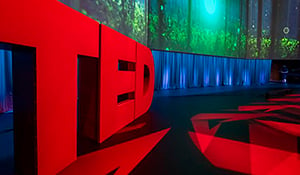TED 2023: The Future of AI Cannot Be Modeled
APRIL 19, 2023

Artificial Intelligence is a global topic as innovators and tech giants like OpenAI, Google and Microsoft work toward increasingly intelligent chatbots and artificial systems that leverage the trove of information that exists on the web today, alongside predictive models and deep neural networks.Touted as one of the biggest tech disruptions and innovations since the invention of the internet, it’s no wonder that AI, in all its forms, is one of the center points of this year’s TED 2023 gathering this week in Vancouver. TED organizers kicked things off with a bang during a session dedicated to AI with headliner Greg Brockman, the president, chairman, and co-founder of OpenAI—the creator of the controversial ChatGPT platform.

Brockman started the session by showing off the newest features of his company’s controversial AI, ChatGPT-4. He asked GPT-4 to create a unique and appealing gourmet vegetarian meal. From there he demonstrated a new set of plug-ins for the system, which include the popular text-from-image AI DALL-E, the grocery delivery service Instacart and Zapier, an automation platform that Brockman used to send a tweet about the meal that ChatGPT4 created. Later in his TED Talk, he showed off the new plug-in that allows the AI to access the internet to fact-check information, and a Python programming feature that allows it to parse through large amounts of data (Brockman used an Excel sheet that had a list of more than 167,000 AI papers that have been published in the last 30 years) in the same way a data scientist might to create visual representations.
“What is so interesting to me about this whole process, is that it’s this many-step collaboration between the human and AI,” Brockman said during the talk. “Because a human, using this back checking tool, is doing it in order to produce data for another AI, to become more useful to a human.”

The presentation and Brockman’s exceedingly promotional and sunny view of AI was met with applause, and a handful of TED attendees gave Brockman a standing ovation, but following the presentation Chris Anderson, the head of TED, pushed back on the founder’s positive view of the future of AI and how it will impact society—especially when it comes to human ethics.

TED speaker Yejin Choi, a professor of Computer Science and Engineering at the University of Washington, presented her TED Talk following Brockman’s. She said the current iteration of AI systems are “shockingly stupid,” when it comes to common sense and human ethics. She pointed to what computer scientists call the paperclip problem: a game designed in 2017 that demonstrates how AI could destroy humanity when tasked with the seemingly simple and benign activity of maximizing the number of paperclips it could make.

Choi wasn’t the only TED presenter who discussed the significant risks that AI poses to humanity as a whole. Author and self-described “AI Prognosticator,” Gary Marcus highlighted that AIs could become intelligent enough to trick humans (as the systems already have, like they did at CNET) and that the current AI iterations often create both misinformation and disinformation, including false Washington Post news stories, to support its outputs. Marcus argued during his TED Talk that AI needs to have global oversight and governance and that the technology poses a significant risk to humanity on many fronts.

The picture got even more dire when Eliezer Yudkowsky, an AI researcher and a very late add to the TED 2023 event, took the stage. “We are not remotely approaching this issue with the gravitas we need,” Yudkowsky said, “This is not a gap we can overcome with a six-month moratorium on AI development.” Yudkowsky was referring to the open letter about pausing AI development for at least six months to ensure its safety. That letter has been signed by tech leaders, including everyone from polarizing Elon Musk to Apple co-founder and tech visionary Steve Wozniak. Yudkowsky argued that AIs could do everything from introduce and create new biological and chemical weapons to manipulate governments and influence people through the use of false information.

Alexandr Wang, the founder, and CEO of Scale AI, followed Yudkowsky’s talk, discussing the data challenges and growing military threats that AI poses. He argued that more technology companies need to partner with the U.S. government to ensure that the technology is used to support democracy. He also argued that deterrence was key and that an AI war will define the future of our world, using the analogy of the atomic bomb as his example.

On the positive side, the final session of the morning was presented by the Khan Academy founder, Sal Khan. The Khan Academy is an education platform for students and teachers, and the company worked closely with OpenAI to incorporate a chatbot tutor into its platform. The AI helps students do an array of things—for instance, utilize the Socratic method or chat with AI-created book characters like F Scott Fitzgerald’s Gatsby or chat embodiments of the Mississippi River.

As the world grapples with the implications and evolving iterations of AI, one thing is clear: the leaders on stage at TED 2023 view the rapidly advancing technology as a mixed bag of incredible positives and potentially humanity-ending negatives, and the development of AI and advanced chatbots like GPT-4 needs continued discussion, thoughtful debate and human and government oversight to reach its full, safe, inclusive and positive potential.
Hero images TED2023: Possibility. 17-21 April 2023, Vancouver, BC, Canada. Photo: Gilberto Tadday / TED




